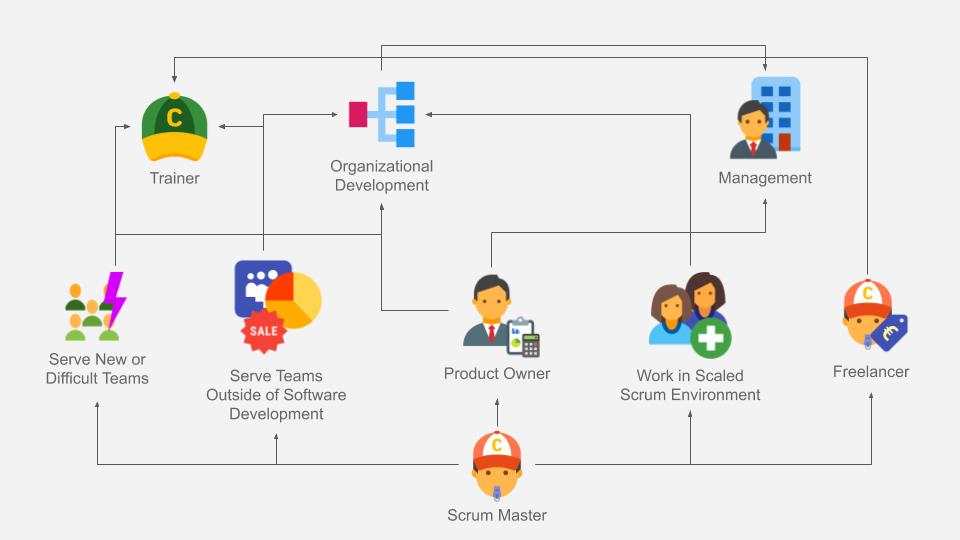What Factors Influence a Professional Scrum Master’s Earnings?
A Professional Scrum Master’s salary can be influenced by various factors, each playing a significant role in determining their earnings. These factors include years of experience, geographical location, industry, and certifications. Understanding these factors can help Scrum Masters better position themselves in the job market and negotiate a competitive salary.
Experience is a crucial factor in determining a Scrum Master’s salary. As Scrum Masters gain more experience, they typically see a corresponding increase in their earnings. This growth is often due to the enhanced skills, knowledge, and value they bring to their organizations. Continuous learning and professional development can further boost a Scrum Master’s salary potential.
Geographical location also plays a significant role in Scrum Master salaries. Salaries can vary significantly between regions, both nationally and internationally. Factors contributing to these discrepancies include cost of living, regional economic conditions, and local demand for Scrum Masters. For example, Scrum Masters working in urban areas or high-tech hubs may earn higher salaries than those in rural or less-developed regions.
The industry in which a Scrum Master works can also impact their salary. Some industries, such as finance, technology, and consulting, tend to offer higher salaries for Scrum Masters due to the complexity and high stakes of their projects. In contrast, other industries may offer lower salaries due to budget constraints or a lower demand for Scrum Masters.
Certifications can provide a significant boost to a Scrum Master’s salary. Popular certifications, such as the Professional Scrum Master (PSM) and Certified ScrumMaster (CSM), can signal a Scrum Master’s expertise and commitment to their profession. Employers may be willing to pay a premium for certified Scrum Masters, recognizing the value they bring to their Agile projects.
The Role of Experience in Scrum Master Salaries
A Scrum Master’s experience significantly influences their salary, with increased experience generally leading to higher earnings. As Scrum Masters gain experience, they develop a deeper understanding of Agile principles, enhance their problem-solving skills, and become better equipped to handle complex projects. This expertise often translates into higher salaries and better job opportunities.
Salary growth is often associated with increased experience in the Scrum Master role. Entry-level Scrum Masters can expect to earn lower salaries, while those with several years of experience typically earn more. This salary progression is due to the increased value Scrum Masters bring to their organizations as they gain experience and can effectively lead Agile teams and manage projects.
Continuous learning and professional development can further boost a Scrum Master’s salary potential. By staying up-to-date with the latest Agile practices, tools, and techniques, Scrum Masters demonstrate their commitment to their profession and their ability to drive successful project outcomes. This dedication can lead to higher salaries, promotions, and increased job satisfaction.
Scrum Masters can pursue various professional development opportunities to enhance their skills and increase their earning potential. These opportunities include attending Agile conferences, participating in workshops, obtaining certifications, and engaging in mentorship programs. By actively investing in their professional growth, Scrum Masters can position themselves for long-term success and higher salaries in the ever-evolving landscape of Agile project management.
Geographical Location and Its Impact on Scrum Master Earnings
A Scrum Master’s geographical location can significantly influence their salary. Salaries can vary between regions, both nationally and internationally, due to factors such as cost of living, regional economic conditions, and local demand for Scrum Masters. Understanding these discrepancies can help Scrum Masters better evaluate job opportunities and negotiate competitive salaries.
In the United States, for example, Scrum Masters in urban areas or high-tech hubs, such as San Francisco or New York, typically earn higher salaries than those in rural or less-developed regions. This salary difference is primarily due to the higher cost of living and the strong demand for Scrum Masters in these areas.
Internationally, countries such as Switzerland, the United States, and Australia offer some of the highest Scrum Master salaries, while regions like India and Eastern Europe generally have lower salaries. These discrepancies can be attributed to differences in the cost of living, economic conditions, and the overall maturity of Agile practices in these countries.
Scrum Masters should consider the impact of geographical location on their salary when evaluating job opportunities or negotiating a raise. Factors such as cost of living, regional economic conditions, and local demand for Scrum Masters can significantly influence earnings. By understanding these factors, Scrum Masters can make informed decisions about their careers and maximize their earning potential in the global market.
Industry Differences in Professional Scrum Master Salaries
The industry in which a Scrum Master works can significantly influence their salary. Some industries offer higher salaries due to the complexity and high stakes of their projects, while others may provide lower salaries due to budget constraints or a lower demand for Scrum Masters. Identifying high-paying industries can help Scrum Masters better evaluate job opportunities and negotiate competitive salaries.
The finance, technology, and consulting industries are known for offering some of the highest Scrum Master salaries. These industries often deal with large-scale, complex projects that require Scrum Masters with advanced skills and expertise. As a result, they are typically willing to pay a premium for top talent.
In contrast, industries such as education, healthcare, and non-profit may offer lower salaries for Scrum Masters. These industries often have limited budgets and may not prioritize Agile practices as highly as other sectors. However, Scrum Masters working in these industries can still find opportunities for growth and advancement, even if the salaries are not as high.
Scrum Masters should consider the impact of industry on their salary when evaluating job opportunities or negotiating a raise. By understanding the salary differences between industries, Scrum Masters can make informed decisions about their careers and maximize their earning potential in the ever-evolving landscape of Agile project management.
The Value of Certifications for Scrum Masters: A Salary Perspective
Certifications can significantly impact a Professional Scrum Master’s salary, as they serve as a tangible demonstration of a Scrum Master’s expertise and commitment to their profession. Employers often view certified Scrum Masters as more valuable due to their verified understanding of Agile principles and practices. By pursuing certifications, Scrum Masters can enhance their skills, increase their earning potential, and stay competitive in the job market.
Two of the most popular certifications for Scrum Masters are the Professional Scrum Master (PSM) and the Certified ScrumMaster (CSM). Both certifications are recognized globally and can provide a substantial boost to a Scrum Master’s salary.
- Professional Scrum Master (PSM): Offered by Scrum.org, the PSM certification is designed to assess a Scrum Master’s understanding of Scrum principles and their ability to apply Scrum in real-world situations. The PSM certification is available at three levels (PSM I, PSM II, and PSM III), with each level requiring a higher degree of mastery.
- Certified ScrumMaster (CSM): Offered by the Scrum Alliance, the CSM certification is focused on teaching Scrum Masters the principles and practices of Scrum and how to apply them in their organizations. The CSM certification requires attendance at a two-day in-person or online course and passing an exam.
Scrum Masters who hold certifications such as the PSM or CSM often receive higher salaries than their uncertified counterparts. According to various salary surveys, Scrum Masters with certifications can earn up to 20% more than those without certifications. By investing in their professional development and pursuing certifications, Scrum Masters can position themselves for long-term success and maximize their earning potential in the Agile project management landscape.
How to Negotiate a Higher Scrum Master Salary
Negotiating a higher salary is a crucial skill for Scrum Masters looking to maximize their earnings in the Agile project management landscape. By conducting thorough research, effectively communicating their value, and demonstrating their expertise, Scrum Masters can successfully negotiate a higher salary and advance their careers.
Follow these actionable tips and strategies to negotiate a higher Scrum Master salary:
- Research the market: Start by researching the average salary range for Scrum Masters in your region, industry, and experience level. Utilize salary surveys, job postings, and industry reports to gather accurate data and establish a baseline for your negotiations.
- Evaluate your value: Assess your skills, experience, and contributions to your organization. Identify any unique strengths, certifications, or achievements that set you apart from other Scrum Masters and make you a valuable asset to your team.
- Choose the right time: Timing is essential when negotiating a salary increase. Request a meeting with your manager when your performance is strong, your organization is financially stable, and there is room in the budget for a salary adjustment.
- Communicate effectively: During the negotiation process, communicate your value and achievements clearly and confidently. Use data and specific examples to demonstrate your impact on the organization and the reasons why you deserve a higher salary.
- Consider alternatives: If a salary increase is not immediately possible, explore alternative compensation options such as bonuses, equity, or additional benefits. These alternatives can still provide a financial boost and demonstrate your value to the organization.
By following these tips and strategies, Scrum Masters can successfully negotiate a higher salary and secure their financial future in the Agile project management landscape. Remember to approach negotiations with confidence, research, and a clear understanding of your value to the organization.
The Future of Scrum Master Salaries: Trends and Predictions
The landscape of Agile project management is constantly evolving, and Scrum Masters must stay informed about emerging trends and future predictions to maximize their earnings and remain competitive in the job market. By understanding these trends, Scrum Masters can prepare for changes and position themselves for long-term success.
Here are some key trends and predictions for Professional Scrum Master salaries:
- Increased demand: As Agile methodologies continue to gain popularity, the demand for Scrum Masters is expected to grow. This increased demand may lead to higher salaries and better job opportunities for Scrum Masters with the right skills and certifications.
- Specialization: Specializing in a particular industry or aspect of Agile project management, such as DevOps or Scaled Agile Framework (SAFe), can lead to higher salaries for Scrum Masters. By developing expertise in a niche area, Scrum Masters can differentiate themselves from their peers and increase their value to potential employers.
- Remote work: The rise of remote work due to the COVID-19 pandemic and advances in technology may impact Scrum Master salaries. Remote work can offer Scrum Masters more flexibility and the ability to work for organizations in different regions, potentially leading to higher salaries.
- Continuous learning: Staying up-to-date with the latest tools, techniques, and best practices in Agile project management is crucial for Scrum Masters looking to advance their careers and increase their earning potential. By continuously learning and developing their skills, Scrum Masters can demonstrate their value to employers and position themselves for success in a rapidly changing job market.
By staying informed about these trends and predictions, Scrum Masters can prepare for changes in the job market and maximize their earnings in the ever-evolving landscape of Agile project management. Remember to remain adaptable, continuously learn, and seek out opportunities for growth and advancement to secure your financial future as a Professional Scrum Master.
Conclusion: Maximizing Your Earnings as a Professional Scrum Master
Throughout this comprehensive overview, we have explored the various factors that can influence a Professional Scrum Master’s salary, including years of experience, geographical location, industry, and certifications. By understanding these factors and their impact on earnings, Scrum Masters can make informed decisions about their careers and take actionable steps to maximize their earnings in the ever-evolving landscape of Agile project management.
Here are some key takeaways and guidance for Scrum Masters looking to increase their earnings:
- Gain experience: Salary growth is typically associated with increased experience. By continuously learning and developing their skills, Scrum Masters can increase their value to potential employers and position themselves for long-term success.
- Consider location: Geographical location can significantly impact a Scrum Master’s salary. By researching salaries in different regions, both nationally and internationally, Scrum Masters can make informed decisions about where to work and negotiate a salary that reflects their expertise and value.
- Choose the right industry: High-paying industries for Scrum Masters include finance, technology, and consulting. By specializing in one of these industries, Scrum Masters can increase their earning potential and advance their careers.
- Pursue certifications: Certifications, such as the Professional Scrum Master (PSM) and Certified ScrumMaster (CSM), can provide a significant boost to a Scrum Master’s salary. By investing in their professional development and pursuing certifications, Scrum Masters can demonstrate their expertise and commitment to the profession.
- Negotiate effectively: Effective negotiation is crucial for Scrum Masters looking to increase their earnings. By researching the market, communicating their value, and demonstrating their impact on the organization, Scrum Masters can successfully negotiate a higher salary and secure their financial future in the Agile project management landscape.
By following this guidance and staying informed about emerging trends and future predictions for Scrum Master salaries, Scrum Masters can position themselves for long-term success and maximize their earnings in the ever-evolving landscape of Agile project management.







